- Home
- Andrzej Sapkowski
Season of Storms
Season of Storms Read online
orbitbooks.net
orbitshortfiction.com
Copyright
This book is a work of fiction. Names, characters, places, and incidents are the product of the author’s imagination or are used fictitiously. Any resemblance to actual events, locales, or persons, living or dead, is coincidental.
Original text copyright © 2013 by Andrzej Sapkowski
English translation copyright © 2018 by David French
Cover design by Lauren Panepinto
Cover Bartłomiej Gaweł and Paweł Brudniak
Cover copyright © 2018 by Hachette Book Group, Inc.
Hachette Book Group supports the right to free expression and the value of copyright. The purpose of copyright is to encourage writers and artists to produce the creative works that enrich our culture.
The scanning, uploading, and distribution of this book without permission is a theft of the author’s intellectual property. If you would like permission to use material from the book (other than for review purposes), please contact [email protected]. Thank you for your support of the author’s rights.
Originally published in Polish as Sezon Burz
Orbit
Hachette Book Group
1290 Avenue of the Americas, New York, NY 10104
orbitbooks.net
Published in arrangement with Patricia Pasqualini, Patricia Pasqualini Literary Agency
Simultaneously published in Great Britain and in the U.S. by Gollancz and Orbit in 2018
First U.S. Edition: May 2018
Orbit is an imprint of Hachette Book Group.
The Orbit name and logo are trademarks of Little, Brown Book Group Limited.
The publisher is not responsible for websites (or their content) that are not owned by the publisher.
The Hachette Speakers Bureau provides a wide range of authors for speaking events. To find out more, go to www.hachettespeakersbureau.com or call (866) 376-6591.
Library of Congress Control Number: 2018936363
ISBNs: 978-0-316-44163-6 (hardcover), 978-0-316-44161-2 (ebook)
E3-20180331-JV-NF
Battle not with monsters, lest ye become a monster; for if you gaze into the abyss, the abyss gazes back into you.
Friedrich Nietzsche, Beyond Good and Evil
I consider gazing into the abyss utter foolishness. There are many things in the world much more worth gazing into.
Dandelion, Half a Century of Poetry
CHAPTER ONE
It lived only to kill.
It was lying on the sun-warmed sand.
It could sense the vibrations being transmitted through its hair-like feelers and bristles. Though the vibrations were still far off, the idr could feel them distinctly and precisely; it was thus able to determine not only its quarry’s direction and speed of movement, but also its weight. As with most similar predators, the weight of the prey was of cardinal importance. Stalking, attacking and giving chase meant a loss of energy that had to be compensated by the calorific value of its food. Most predators similar to the idr would quit their attack if their prey was too small. But not the idr. The idr didn’t exist to eat and sustain the species. It hadn’t been created for that.
It lived to kill.
Moving its limbs cautiously, it exited the hollow, crawled over a rotten tree trunk, covered the clearing in three bounds, plunged into the fern-covered undergrowth and melted into the thicket. It moved swiftly and noiselessly, now running, now leaping like a huge grasshopper.
It sank into the thicket and pressed the segmented carapace of its abdomen to the ground. The vibrations in the ground became more and more distinct. The impulses from the idr’s feelers and bristles formed themselves into an image. Into a plan. The idr now knew where to approach its victim from, where to cross its path, how to force it to flee, how to swoop on it from behind with a great leap, from what height to strike and lacerate with its razor-sharp mandibles. Within it the vibrations and impulses were already arousing the joy it would experience when its victim started struggling under its weight, arousing the euphoria that the taste of hot blood would induce in it. The ecstasy it would feel when the air was rent by a scream of pain. It trembled slightly, opening and closing its pincers and pedipalps.
The vibrations in the ground were very distinct and had also diversified. The idr now knew there was more than one victim—probably three, or perhaps four. Two of them were shaking the ground in a normal way; the vibrations of the third suggested a small mass and weight. The fourth, meanwhile—provided there really was a fourth—was causing irregular, weak and hesitant vibrations. The idr stopped moving, tensed and extended its antennae above the grass, examining the movements of the air.
The vibrations in the ground finally signalled what the idr had been waiting for. Its quarry had separated. One of them, the smallest, had fallen behind. And the fourth—the vague one—had disappeared. It had been a fake signal, a false echo. The idr ignored it.
The smallest target moved even further away from the others. The trembling in the ground was more intense. And closer. The idr braced its rear limbs, pushed off and leaped.
The little girl gave an ear-splitting scream. Rather than running away, she had frozen to the spot. And was screaming unremittingly.
The Witcher darted towards her, drawing his sword mid-leap. And realised at once that something was wrong. That he’d been tricked.
The man pulling a handcart loaded with faggots screamed and shot six feet up into the air in front of Geralt’s eyes, blood spraying copiously from him. He fell, only to immediately fly up again, this time in two pieces, each spurting blood. He’d stopped screaming. Now the woman was screaming piercingly and, like her daughter, was petrified and paralysed by fear.
Although he didn’t believe he would, the Witcher managed to save her. He leaped and pushed hard, throwing the blood-spattered woman from the path into the forest, among the ferns. And realised at once that this time, too, it had been a trick. A ruse. For the flat, grey, many-limbed and incredibly quick shape was now moving away from the handcart and its first victim. It was gliding towards the next one. Towards the still shrieking little girl. Geralt sped after the idr.
Had she remained where she was, he would have been too late. But the girl demonstrated presence of mind and bolted frantically. The grey monster, however, would easily have caught up with her, killed her and turned back to dispatch the woman, too. That’s what would have happened had it not been for the Witcher.
He caught up with the monster and jumped, pinning down one of its rear limbs with his heel. If he hadn’t jumped aside immediately he would have lost a leg—the grey creature twisted around with extraordinary agility, and its curved pincers snapped shut, missing him by a hair’s breadth. Before the Witcher could regain his balance the monster sprang from the ground and attacked. Geralt defended himself instinctively with a broad and rather haphazard swing of his sword that pushed the monster away. He hadn’t wounded it, but now he had the upper hand.
He sprang up and fell on the monster, slashing backhand, cleaving the carapace of the flat cephalothorax. Before the dazed creature came to its senses, a second blow hacked off its left mandible. The monster attacked, brandishing its limbs and trying to gore him with its remaining mandible like an aurochs. The Witcher hacked that one off too. He slashed one of the idr’s pedipalps with a swift reverse cut. Then hacked at the cephalothorax again.
It finally dawned on the idr that it was in danger. That it must flee. Flee far from there, take cover, find a hiding place. It only lived to kill. In order to kill it must regenerate. It must flee … Flee …
The Witcher didn’t let it. He caught up with it, stepped on the rear segment of the thorax and cut from above with a fierce blow. This
time, the carapace gave way, and viscous, greenish fluid gushed and poured from the wound. The monster flailed around, its limbs thrashing the ground chaotically.
Geralt cut again with his sword, this time completely severing the flat head from the body.
He was breathing heavily.
It thundered in the distance. The growing wind and darkening sky heralded an approaching storm.
Right from their very first encounter, Albert Smulka, the newly appointed district reeve, reminded Geralt of a swede—he was stout, unwashed, thick-skinned and generally pretty dull. In other words, he didn’t differ much from all the other district clerks Geralt had dealt with.
“Would seem to be true,” said the reeve. “Nought like a witcher for dealing with troubles. Jonas, my predecessor, couldn’t speak highly enough of you,” he continued a moment later, not waiting for any reaction from Geralt. “To think, I considered him a liar. I mean that I didn’t completely lend credence to him. I know how things can grow into fairy tales. Particularly among the common folk, with them there’s always either a miracle or a marvel, or some witcher with superhuman powers. And here we are, turns out it’s the honest truth. Uncounted people have died in that forest beyond the little river. And because it’s a shortcut to the town the fools went that way … to their own doom. Heedless of warnings. These days it’s better not to loiter in badlands or wander through forests. Monsters and man-eaters everywhere. A dreadful thing has just happened in the Tukaj Hills of Temeria—a sylvan ghoul killed fifteen people in a charcoal-burners’ settlement. It’s called Rogovizna. You must have heard. Haven’t you? But it’s the truth, cross my heart and hope to die. It’s said even the wizardry have started an investigation in that there Rogovizna. Well, enough of stories. We’re safe here in Ansegis now. Thanks to you.”
He took a coffer from a chest of drawers, spread out a sheet of paper on the table and dipped a quill in an inkwell.
“You promised you’d kill the monster,” he said, without raising his head. “Seems you weren’t having me on. You’re a man of your word, for a vagabond … And you saved those people’s lives. That woman and the lass. Did they even thank you? Express their gratitude?”
No, they didn’t. The Witcher clenched his jaw. Because they haven’t yet fully regained consciousness. And I’ll be gone before they do. Before they realise I used them as bait, convinced in my conceited arrogance that I was capable of saving all three of them. I’ll be gone before it dawns on the girl, before she understands I’m to blame for her becoming a half-orphan.
He felt bad. No doubt because of the elixirs he’d taken before the fight. No doubt.
“That monster is a right abomination.” The reeve sprinkled some sand over the paper, and then shook it off onto the floor. “I had a look at the carcass when they brought it here … What on earth was it?”
Geralt wasn’t certain in that regard, but didn’t intend to reveal his ignorance.
“An arachnomorph.”
Albert Smulka moved his lips, vainly trying to repeat the word.
“Ugh, meks no difference, when all’s said and done. Did you dispatch it with that sword? With that blade? Can I take a look?”
“No, you can’t.”
“Ha, because it’s no doubt enchanted. And it must be dear … Quite something … Well, here we are jawing away and time’s passing. The task’s been executed, time for payment. But first the formalities. Make your mark on the bill. I mean, put a cross or some such.”
The Witcher took the bill from Smulka and held it up to the light.
“Look at ’im.” The reeve shook his head, grimacing. “What’s this, can he read?”
Geralt put the paper on the table and pushed it towards the official.
“A slight error has crept into the document,” he said, calmly and softly. “We agreed on fifty crowns. This bill has been made out for eighty.”
Albert Smulka clasped his hands together and rested his chin on them.
“It isn’t an error.” He also lowered his voice. “Rather, a token of gratitude. You killed the monster and I’m sure it was an exacting job … So the sum won’t astonish anyone …”
“I don’t understand.”
“Pull the other one. Don’t play the innocent. Trying to tell me that when Jonas was in charge he never made out bills like this? I swear I—”
“What do you swear?” Geralt interrupted. “That he inflated bills? And went halves with me on the sum the royal purse was deprived of?”
“Went halves?” the reeve sneered. “Don’t be soft, Witcher, don’t be soft. Reckon you’re that important? You’ll get a third of the difference. Ten crowns. It’s a decent bonus for you anyway. For I deserve more, if only owing to my function. State officials ought to be wealthy. The wealthier the official, the greater the prestige to the state. Besides, what would you know about it? This conversation’s beginning to weary me. You signing it or what?”
The rain hammered on the roof. It was pouring down outside. But the thunder had stopped; the storm had moved away.
INTERLUDE
Two days later
“Do come closer, madam.” Belohun, King of Kerack, beckoned imperiously. “Do come closer. Servants! A chair!”
The chamber’s vaulting was decorated with a plafond of a fresco depicting a sailing ship at sea, amidst mermen, hippocampi and lobster-like creatures. The fresco on one of the walls, however, was a map of the world. An absolutely fanciful map, as Coral had long before realised, having little in common with the actual locations of lands and seas, but pleasing and tasteful.
Two pages lugged in and set down a heavy, carved curule seat. The sorceress sat down, resting her hands on the armrests so that her ruby-encrusted bracelets would be very conspicuous and not escape the king’s attention. She had a small ruby tiara on her coiffed hair, and a ruby necklace in the plunging neckline of her dress. All especially for the royal audience. She wanted to make an impression. And had. King Belohun stared goggle-eyed: though it wasn’t clear whether at the rubies or the cleavage.
Belohun, son of Osmyk, was, it could be said, a first-generation king. His father had made quite a considerable fortune from maritime trade, and probably also a little from buccaneering. Having finished off the competition and monopolised the region’s cabotage, Osmyk named himself king. That act of self-anointed coronation had actually only formalised the status quo, and hence did not arouse significant quibbles nor provoke protests. Over the course of various private wars and skirmishes, Osmyk had smoothed over border disputes and jurisdictional squabbles with his neighbours, Verden and Cidaris. It was established where Kerack began, where it finished and who ruled there. And since he ruled, he was king—and deserved the title. By the natural order of things titles and power pass from father to son, so no one was surprised when Belohun ascended his father’s throne, following Osmyk’s death. Osmyk admittedly had more sons—at least four of them—but they had all renounced their rights to the crown, one of them allegedly even of his own free will. Thus, Belohun had reigned in Kerack for over twenty years, deriving profits from shipbuilding, freight, fishery and piracy in keeping with family traditions.
And now King Belohun, seated on a raised throne, wearing a sable calpac and with a sceptre in one hand, was granting an audience. As majestic as a dung beetle on a cowpat.
“Our dear Madam Lytta Neyd,” he greeted her. “Our favourite sorceress, Lytta Neyd. She has deigned to visit Kerack again. And surely for a long stay again?”
“The sea air’s good for me.” Coral crossed her legs provocatively, displaying a bootee with fashionable cork heels. “With the gracious permission of Your Royal Highness.”
The king glanced at his sons sitting beside him. Both were tall and slender, quite unlike their father, who was bony and sinewy, but of not very imposing height. Neither did they look like brothers. The older, Egmund, had raven-black hair, while Xander, who was a little younger, was almost albino blond. Both looked at Lytta with dislike. They were evidently annoye
d by the privilege that permitted sorceresses to sit in the presence of kings, and that such seated audiences were granted to them. The privilege was well established, however, and could not be flouted by anyone wanting to be regarded as civilised. And Belohun’s sons very much wanted to be regarded as civilised.
“We graciously grant our permission,” Belohun said slowly. “With one proviso.”
Coral raised a hand and ostentatiously examined her fingernails. It was meant to signal that she couldn’t give a shit about Belohun’s proviso. The king didn’t decode the signal. Or if he did he concealed it skilfully.
“It has reached our ears,” he puffed angrily, “that the Honourable Madam Neyd makes magical concoctions available to womenfolk who don’t want children. And helps those who are already pregnant to abort the foetus. We, here in Kerack, consider such a practice immoral.”
“What a woman has a natural right to,” replied Coral, dryly, “cannot—ipso facto—be immoral.”
“A woman—” the king straightened up his skinny frame on the throne “—has the right to expect only two gifts from a man: a child in the summer and thin bast slippers in the winter. Both the former and the latter gifts are intended to keep the woman at home, since the home is the proper place for a woman—ascribed to her by nature. A woman with a swollen belly and offspring clinging to her frock will not stray from the home and no foolish ideas will occur to her, which guarantees her man peace of mind. A man with peace of mind can labour hard for the purpose of increasing the wealth and prosperity of his king. Neither do any foolish ideas occur to a man confident of his marriage while toiling by the sweat of his brow and with his nose to the grindstone. But if someone tells a woman she can have a child when she wants and when she doesn’t she mustn’t, and when to cap it all someone offers a method and passes her a physick, then, Honourable Lady, then the social order begins to totter.”

 something ends something begins sapkowski
something ends something begins sapkowski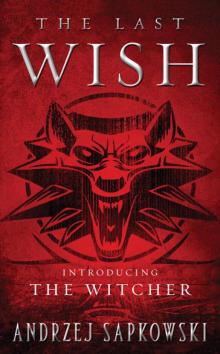 The Last Wish
The Last Wish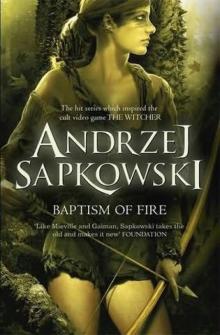 Baptism of Fire
Baptism of Fire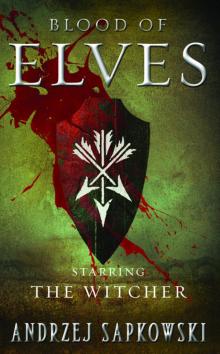 Blood of Elves
Blood of Elves Lastavičja Kula
Lastavičja Kula Gospodarica Jezera
Gospodarica Jezera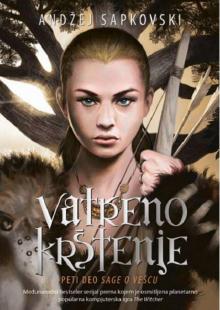 Vatreno Krštenje
Vatreno Krštenje Sezona Oluja
Sezona Oluja Lady of the Lake
Lady of the Lake The Road With No Return
The Road With No Return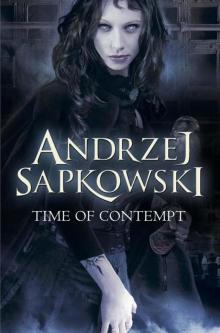 Time of Contempt
Time of Contempt Mač Sudbine
Mač Sudbine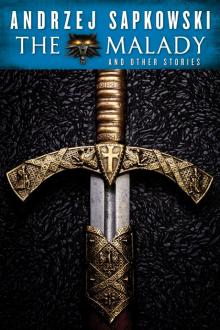 The Malady and Other Stories: An Andrzej Sapkowski Sampler
The Malady and Other Stories: An Andrzej Sapkowski Sampler The Saga of the Witcher
The Saga of the Witcher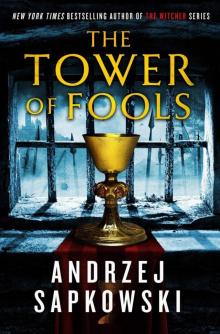 The Tower of Fools
The Tower of Fools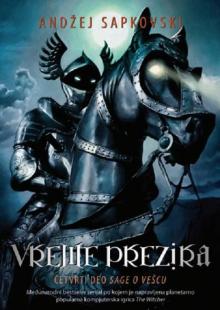 Vreme Prezira
Vreme Prezira Introducing the Witcher
Introducing the Witcher Stephen Hulin
Stephen Hulin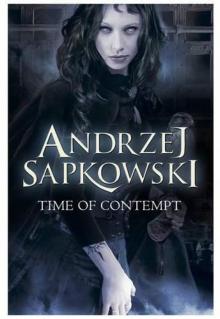 The Time of Contempt
The Time of Contempt The Sword of Destiny
The Sword of Destiny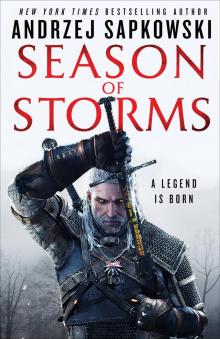 Season of Storms
Season of Storms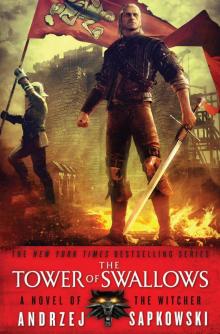 The Tower of Swallows
The Tower of Swallows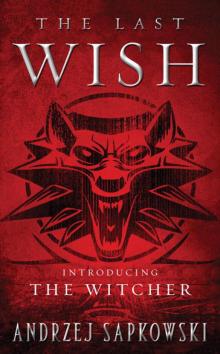 The Last Wish: Introducing The Witcher
The Last Wish: Introducing The Witcher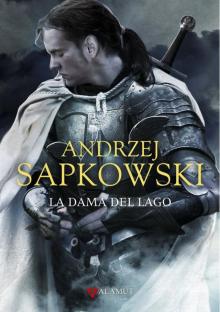 The Lady of the Lake
The Lady of the Lake